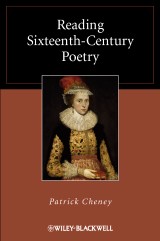Details

Reading Sixteenth-Century Poetry
1. Aufl.
|
30,99 € |
|
| Verlag: | Wiley-Blackwell |
| Format: | |
| Veröffentl.: | 25.02.2011 |
| ISBN/EAN: | 9781444396546 |
| Sprache: | englisch |
| Anzahl Seiten: | 352 |
DRM-geschütztes eBook, Sie benötigen z.B. Adobe Digital Editions und eine Adobe ID zum Lesen.
Beschreibungen
<i>Reading Sixteenth-Century Poetry</i> combines close readings of individual poems with a critical consideration of the historical context in which they were written. Informative and original, this book has been carefully designed to enable readers to understand, enjoy, and be inspired by sixteenth-century poetry. <ul type="disc"> <li>Close reading of a wide variety of sixteenth-century poems, canonical and non-canonical, by men and by women, from print and manuscript culture, across the major literary modes and genres</li> <li>Poems read within their historical context, with reference to five major cultural revolutions: Renaissance humanism, the Reformation, the modern nation-state, companionate marriage, and the scientific revolution</li> <li>Offers in-depth discussion of Skelton, Wyatt, Surrey, Isabella Whitney, Gascoigne, Philip Sidney, Spenser, Marlowe, Mary Sidney Herbert, Donne, and Shakespeare</li> <li>Presents a separate study of all five of Shakespeare’s major poems - <i>Venus and Adonis</i>, <i>The Rape of Lucrece</i>, 'The Phoenix and Turtle,' the <i>Sonnets</i>, and <i>A Lover's Complaint-</i> in the context of his dramatic career</li> <li>Discusses major works of literary criticism by Plato, Aristotle, Horace, Longinus, Philip Sidney, George Puttenham, Percy Bysshe Shelley, Seamus Heaney, Adrienne Rich, and Helen Vendler</li> </ul>
<p>Introduction 1<br /> <i>The Pleasures and Uses of Sixteenth-Century Poetry </i></p> <p><b>Part I 1500–1558. Reading Early Tudor Poetry: Henrician, Edwardian, Marian 19</b></p> <p>1 Voice 21<br /> <i>The Poetic Style of Character: Plain and Eloquent Speaking </i></p> <p>2 Perception 43<br /> <i>The Crisis of the Reformation, or, What the Poet Sees: Self, Beloved, God </i></p> <p>3 World 66<br /> <i>The Poet’s Ecology of Place: Sky, Sea, Soil </i></p> <p>4 Form 90<br /> <i>The Idea of a Poem: Elegy, Pastoral, Sonnet, Satire, Epic </i></p> <p>5 Career 115<br /> <i>The Role of the Poet in Society: Skelton, Wyatt, and Surrey </i></p> <p><b>Part II 1558–1600. Reading Elizabethan Poetry 139</b></p> <p>6 Voice 141<br /> <i>The Poetic Style of Character: From Plain Eloquence to the Metaphysical Sublime</i></p> <p>7 Perception 163<br /> <i>What the Poet Sees, and the Advent of Modern Personage: Desire, Idolatry, Transport, Partnership</i></p> <p>8 World 185<br /> <i>The Poet’s Ecology of Place: Cosmos, Colony, Country </i></p> <p>9 Form 208<br /> <i>Fictions of Poetic Kind: Pastoral, Sonnet, Epic, Minor Epic, Hymn</i></p> <p>10 Career 231<br /> <i>The Role of the Poet in Society: Whitney, Spenser, and Marlowe</i></p> <p><b>Part III A Special Case 255</b></p> <p>11 Shakespeare: Voice, Perception, World, Form, Career 257</p> <p>Conclusion 280<br /> <i>Retrospective Poetry: Donne and the End of Sixteenth-Century Poetry </i></p> <p>Bibliography 288</p> <p>Index 323</p>
<p>“Highly useful in addressing the formal and generic concerns of sixteenth-century poets, and thus in demonstrating close reading<i>,</i> <i>Reading Sixteenth-Century Poetr</i><i>y</i> fails to address the equally important political and theoretical period discourses or the methodologies needed to address them. The unbalanced infatuation with authorial vocation and authorial perspectives thus limits the usefulness of the text. Cheney’s companion text may thus represent a more widespread return to traditional author-centered interpretive theories and a<br /> turn away from poststructural approaches.” (<i>Journal of the Northern Renaissance</i>, 1 December 2012)</p> "Cheney's eye for such intertextual allusion transforms what could have been a series of isolated close readings into a delicately unified exposition of a century's worth of literary dialogue." (Times Literary Supplement, 23 December 2011) <p>"A carefully selected bibliography that focuses on background sources as well as on primary works and significant critical material is a valuable supplement to the author's consideration of the poetry. Cheney develops his thesis clearly and makes an important contribution to Renaissance scholarship. Recommended. Upper-division undergraduates through faculty." (Choice, 1 October 2011)</p>
<b>Patrick Cheney</b> is Distinguished Professor of English and Comparative Literature at Penn State University. He is the author of books on Shakespeare, Marlowe, and Spenser, most recently <i>Shakespeare’s Literary Authorship</i> (2008) and <i>Marlowe’s Republican Authorship: Lucan, Liberty, and the Sublim</i>e (2009). He has also edited <i>Cambridge Companions</i> to Marlowe and Shakespeare’s Poetry, co-edited <i>Oxford Companions</i> to early modern English poetry and drama, and co-edited an Oxford edition of Marlowe’s poems. Currently, he serves as a General Editor of <i>The Oxford Edition of the Collected Works of Edmund Spenser</i>.
<i>Reading Sixteenth-Century Poetry</i> combines close readings of individual poems with a critical consideration of the historical context in which they were written. <p>Esteemed Early Modern critic Patrick Cheney emphasises the accessibility of poetry written during the sixteenth century by illuminating the dynamic and enduring nature of these works and their ability to influence readers' lives. A broad range of poetic genres are discussed, including lyric, narrative, and the dramatic, featuring a variety of poets, such as Skelton, Wyatt, Surrey, Isabella Whitney, Gascoigne, Philip Sidney, Spenser, Marlowe, Mary Sidney Herbert, Donne, and Shakespeare.</p> <p>Informative and original, this book has been carefully designed to enable readers to understand, enjoy, and be inspired by sixteenth-century poetry.</p>
"Patrick Cheney's "Reading Sixteenth Century Poetry" provides a new and indispensible map of English poetry together with its voices, career structures, influences and historical contexts. Cheney's cohesive account challenges the standard narrative about the development of poetry in England and does so through dazzling readings of the verse. The volume's well-paced, lucid prose style also succeeds in making it accessible to undergraduates even as it provides fresh and important insights for scholars. Everybody should teach this book."<br /> —<b>Dympna Callaghan</b>, Syracuse University <p>"Patrick Cheney's <i>Reading Sixteenth-Century Poetry</i> is remarkable. Not only does it constitute a masterful and eminently readable introduction to some of the greatest poetry in the English language, but it also provides a set of enabling tools with which this poetry is best approached. Providing close analysis and the broad picture, paying attention to text as well as context, Cheney is a compelling guide to how to read sixteenth-century poetry. I cannot imagine a student who will not greatly benefit from this study."<br /> —<b>Lukas Erne</b>, University of Geneva</p>

















